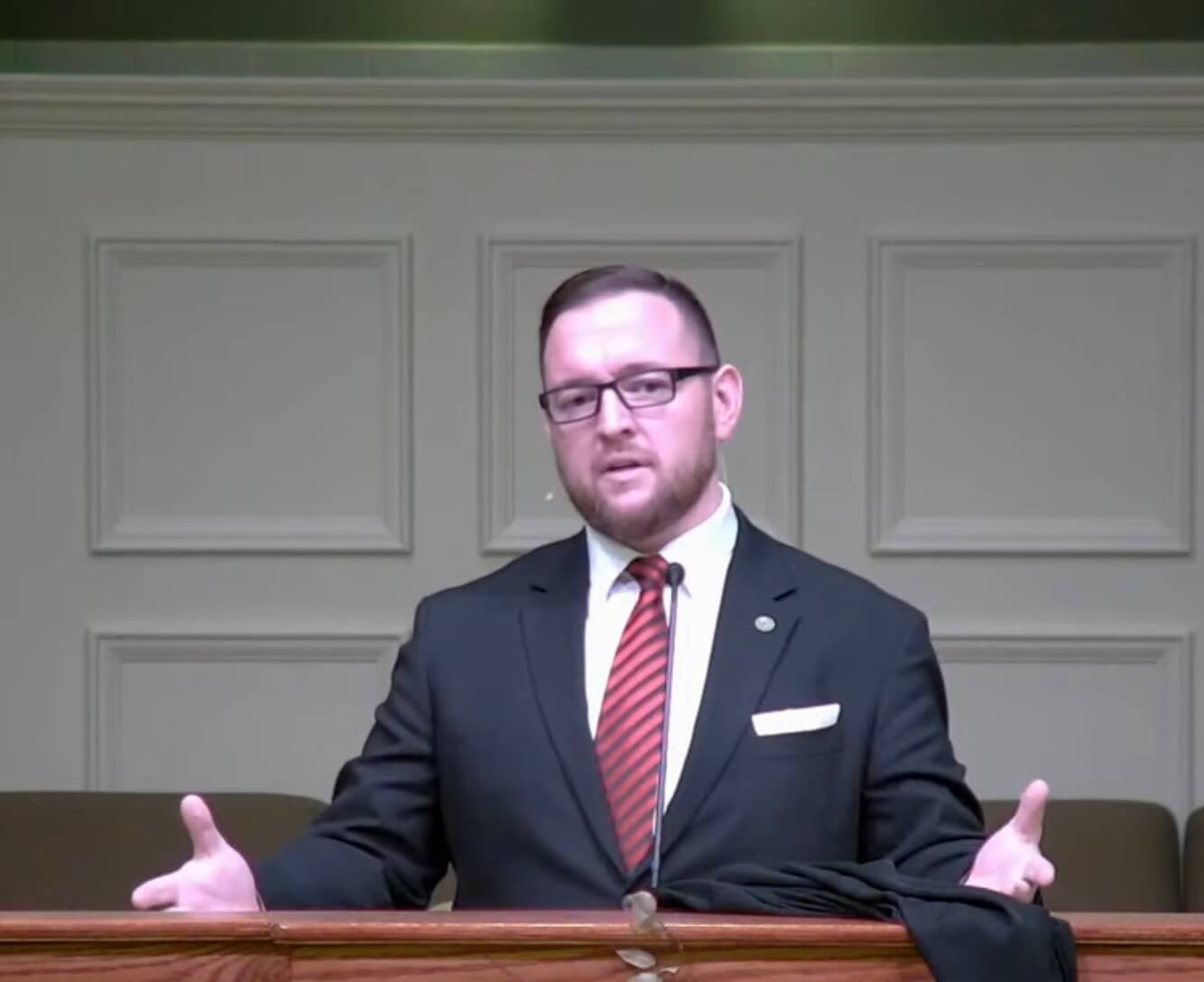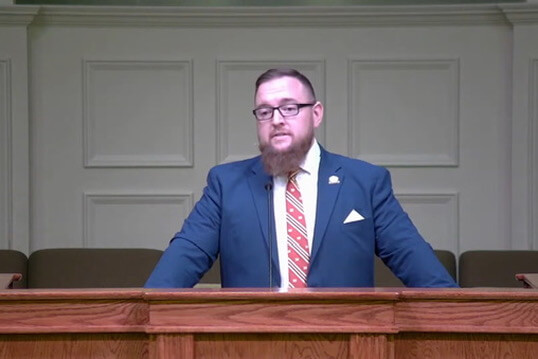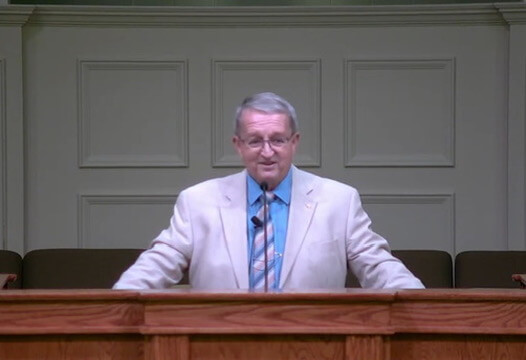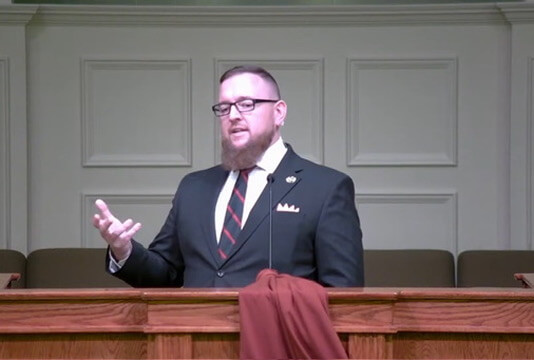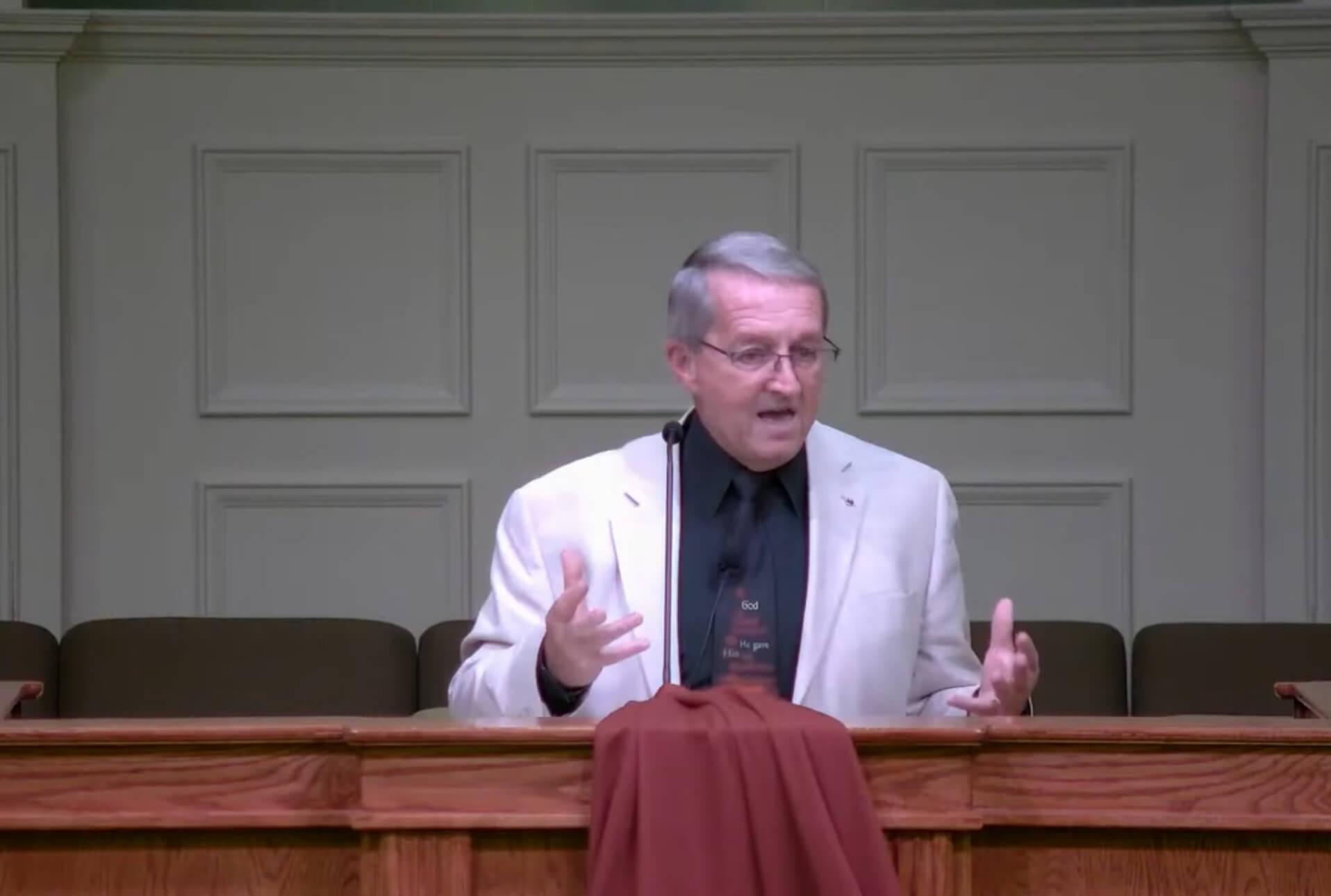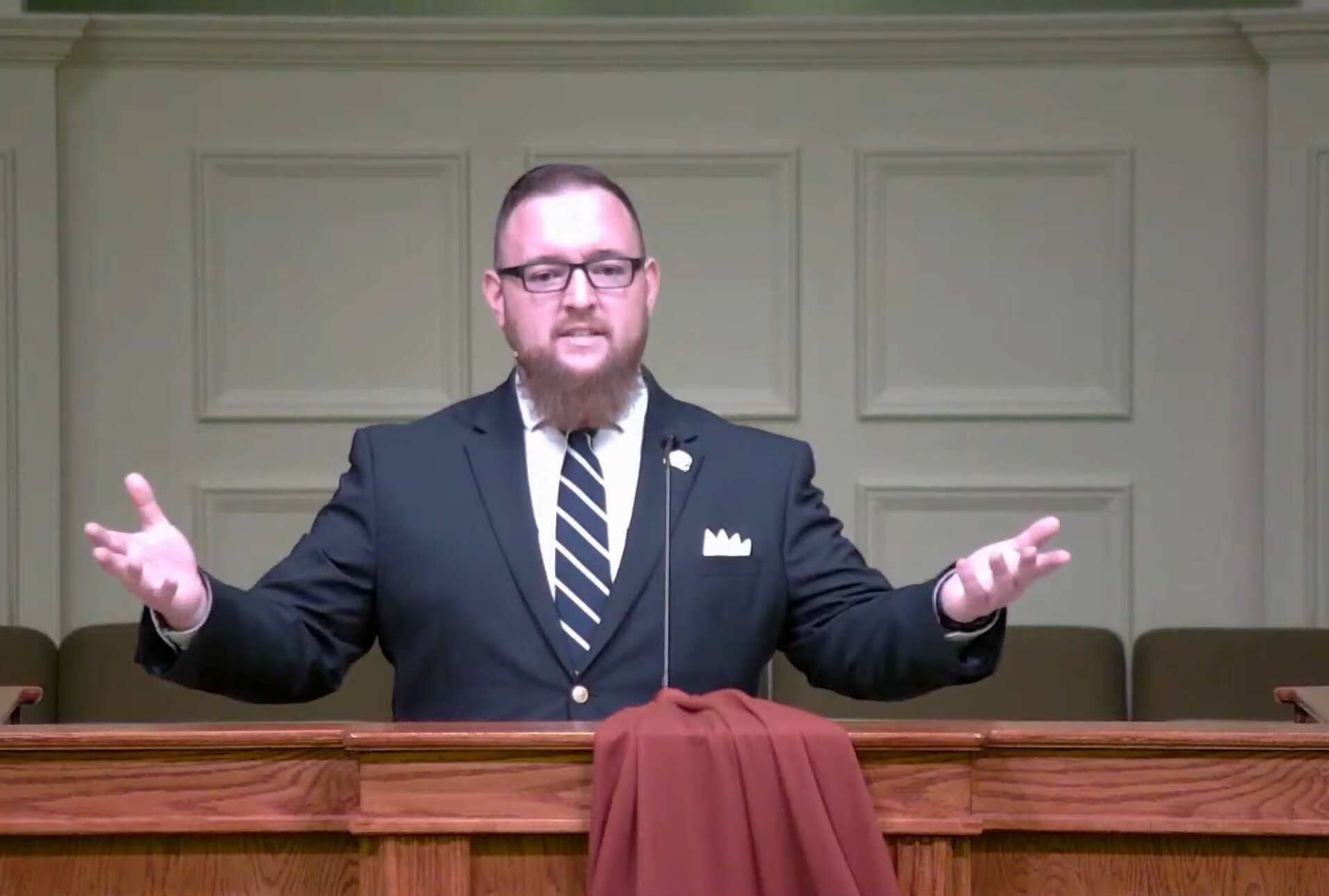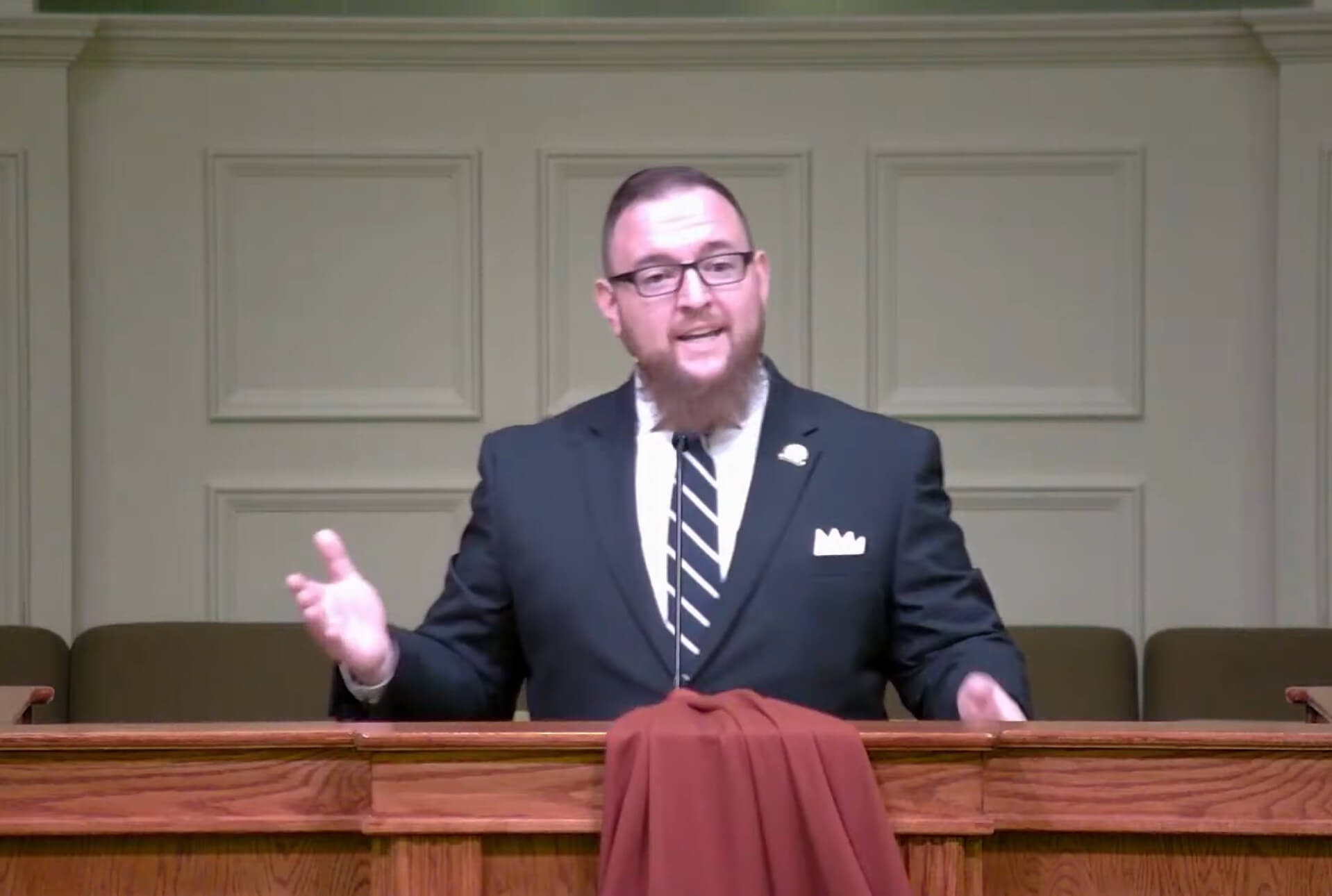Video
“Children of God”
Pastor Ryan J. McKeen | 1 John 3:1-3
|
February 18 2024
Audio
Transcript
But as many as received him, to them he gave the right to become the children of God, even to those who believe on his name. That’s from the Gospel of John, chapter one, verse 12.
Do you ever consider what it means that you’re adopted as God’s child? That you have been given the right to become a child of God? Do you ever stop and consider that? That’s exactly what John does in our text this evening.
So turn with me, if you could, to the letter of 1 John. 1 John, and we’ve come to chapter 3 now in 1 John. We finished chapter 2 a couple weeks ago, and in chapter 2, we saw that John warned against these antichrists, how these antichrists had already come and they would continue to come. And in fact, that’s how we know it is the last days. And he specifically says, we know they’re antichrists because they’re not of us. And they revealed they are not of us because they went out from us.
Verse 19 of chapter 2 says, they went out from us, but they were not really of us. For if they were of us, they would have remained with us. But they went out so that it would be manifested that they are not all of us. That is the backdrop for this text we will be in this evening. As John was walking through this argument, really comforting the believers there in this church because of those who had left.
You can see, obviously, there was some real concern with these believers over those who left, over those who didn’t leave, and why they left. And so that’s the discussion that John is coming through. And as we came through that text several weeks ago, we looked at the differences between the antichrists and Christians that John presented. Specifically, that they leave, that they deny Christ, and that they lie. And true believers stay. They confess Christ, and they do believe the truth. They cannot be deceived, John says. That’s really what it comes down to. That’s the difference. They leave, they deny, and they lie, and we stay, confess, and believe. That’s the difference John is presenting here.
And we saw the last time we were in 1 John that he was closing that section with an encouragement to abide in him, to abide in Christ, to remain in Christ. He says there in verse 28, and now little children abide in him so that when he is manifested, we may have confidence and not shrink away from him in shame at his coming. If you know that he is righteous, you know that everyone who also does righteousness has been born of him. And that’s where we left off last time. Everyone who does righteousness has been born of him.
And here at the beginning of chapter three in 1 John, we really see one of those times in scripture where it’s quite obvious that the chapter divisions were not original. The chapters were added later to help us navigate our Bibles, but this is one letter. And they would have read it as like a letter you would receive from somebody. It’s one continuous flow of thought. So it’s not as though the end of chapter 2, John stopped what he was thinking about and starts something new in chapter 3. In chapter 3, he almost takes a brief pause to consider what he just said.
The last statement of 29, as we saw, is, everyone who does righteousness has been born of him. And it’s almost as though John says, now hold on a minute. Let’s think about that for a second. What does it mean to be born of Him? Have you ever thought about what it is to be born of Him? So that’s what we’ll be looking at this evening in verses 1 through 3 of chapter 3 here. Verses 1 and 2 are really John’s parentheses in the middle of his discussion.
We’ll be looking at what it means to be the children of God. And that’s a phrase that’s used often, to be the children of God. It’s used a lot. Sometimes it’s used properly, and sometimes maybe not. Some would tell you that we’re all God’s children. Everyone, everywhere. We’re all God’s children. Well, I guess in a sense, because we’re made in the image of God, if you think of it that way, but in the sense that John is talking about, No, we are not all God’s children. We as believers are God’s children, but every person is not born of Him, is not a child of God in the sense that John is talking about. And that’s what he’s been making the case for throughout this whole letter. He’s making a distinction.
He’s making a distinction between true believers and those who had left, those who were not true believers. But the focus tonight is, what does it mean to be a child of God? The theological idea is adoption. Now we know adoption through the idea of bringing a child into your home that is not your natural biological descendant. That’s the idea we have of adoption, and that’s very similar to what the adoption idea was in those days.
In Roman law, however, adoption was often done between adults. A man would adopt another man who wasn’t his relative to be his heir. It was not necessarily to be parenting a child, it was more to pass on inheritance. That was the idea of adoption there. Adoption is a big deal. Adoption is central to what it means to be a Christian.
In the Confession, in our London Baptist Confession, it says, they have a whole chapter on adoption. And in chapter 12, which is on adoption, it says this, God has granted that all who are justified would receive the grace of adoption in and for the sake of His only Son, Jesus Christ. By this, they are counted among the children of God and enjoy the freedom and privileges of that relationship. They inherit his name, receive the spirit of adoption, have access to the throne of grace with boldness, and are enabled to cry, Abba, Father. They are given compassion, protected, provided for, and chastened by him as a father. Yet they are never cast off, but are sealed for the day of redemption, and inherit the promises as heirs of everlasting salvation.
There’s a lot to adoption. There’s a lot involved with what it means to be adopted as a child of God. All of those blessings that were listed there, are true of us as Christians because of adoption. As I began this evening with John chapter one, verse 12, but as many as received him, to them he gave the right to become the children of God. It’s not to all, not everyone is a child of God, but only to those who receive him. To them he gave the right to become the children of God. And the Apostle John here is amazed. He is infatuated, he is obsessed with the doctrine of adoption. He speaks of it so often. It’s throughout his gospel, it’s throughout this letter. To be children of God. It means so much to our understanding as a Christian.
J.I. Packer wrote a monumental book called Knowing God. If you have not read that book, it would be a good one to read. It really is an excellent book. But he has a whole chapter on adoption in that book. And in that book, he really boils down the message of the New Testament into three words, and that’s adoption through propitiation. That’s really, if you could boil it down that much, that’s what he says the whole New Testament is about. He says adoption is the highest privilege that the gospel offers. We get a lot of privileges because of the gospel, because of what Christ did for us. But he is arguing that the highest privilege is that we are adopted. We are adopted as God’s children.
He goes on to say that our understanding of Christianity cannot be better than our grasp of adoption. So if we want to understand what it means to be a Christian, a good place to start is to understand what it means to be adopted and all that comes with that. Later on he says, if you want to judge how well a person understands Christianity, find out how much he makes of the thought of being God’s child and having God as his father. If this is not the thought that prompts and controls his worship and prayers and his whole outlook on life, it means he doesn’t understand Christianity very well. And I think he’s got a point.
It’s hard to understand Christianity very well if you don’t understand that you’re adopted, that you’re a child of God. There is no greater privilege. Not forgiveness, not escaping hell, not fellowship with other believers. Those are great privileges. But to be God’s child.
And that’s what we’ll be looking at this evening, the privilege of adoption. And we will look at 1 John 3, 1 through 3, and we’ll look at three different privileges of adoption. We’ll look at the wonder of adoption, because that’s really the best way to describe John’s take on adoption, what he’s expressing there, the wonder of adoption. We’ll talk about the grace of adoption, and then we’ll talk about the blessings of adoption. And there’s five blessings that we will speak of, and that’s all from this text, 1 John 3, 1 through 3.
So now let’s read this passage this evening. 1 John 3, 1-3, this is the word of the Lord. See how great a love the Father has given to us, that we would be called the children of God, and we are. For this reason the world does not know us, because it did not know him. Beloved, now we are the children of God, and it has not been manifested as yet what we will be, We know that when he is manifested, we will be like him because we will see him as he is. And everyone who has this hope fixed on him purifies himself just as he is pure.
So you see, right from the first word there, the wonder of adoption. The wonder. John starts this verse with, This word, in many versions, it’s behold, or see, or he’s getting your attention. Listen. He was cruising right along in his argument to abide in Christ because of the Antichrist and how they’ve gone out, and we’ve remained, and you need to stay encouraged, so abide in Christ because everyone who does righteousness is born of him. And he’s like, wait a minute. Think about that. Behold.
This is an attention-grabbing word. It’s supposed to make us stop and take notice. It’s supposed to make us sit up and listen to what John is saying here. And John’s almost asking, do you understand how amazing this is? Do you know how wonderful it is? And John says, see, or behold, how great a love the Father has given to us. Or some may say, what kind of love? What kind of love the Father has given to us.
Now we have the song that we could have sung tonight, but I didn’t choose that one, but behold what manner of love the Father has given to us. That whole song is taken right from this chapter. And it’s really an expression of astonishment. John almost can’t believe what he’s writing, that we are the children of God. It’s like he’s saying, where does this come from? What kind of love is this?
You see a similar expression in Matthew chapter 8. So if you can flip over to Matthew chapter 8, just quickly. Matthew 8, 27. This is where Jesus calms the storm. In Matthew 8, Let me see, am I in 27? Oh yeah, 27. So he calms the storm and he said to them, why are you so cowardly, you men of little faith? And he got up and rebuked the winds and the sea and he came and it became perfectly calm. And the men marveled and said, what kind of a man is this that even the winds and the sea obey him? What kind of a man is this? We’ve never seen a man that can do this. We can’t believe our eyes. Do you see what just happened? What’s going on here? What kind of a man is this? Well, it’s the same expression that John’s using here. What kind of love is this? Can you believe this? What kind of love is this?
God’s adoption of believers as his children is unparalleled in this world. It really doesn’t make any sense to us, if you understand it correctly. It should be astonishing. The God of the universe, who created everything at the sound of His voice, everything there is, and yet He chooses to adopt some of His creation as His own, as His children. John is astonished at the love of God here. That even though we hated God, we were rebellious sinners, God stepped in and he redeemed us and he made us his children. And it says, behold, how great a love that the Father has given to us that we should be called the children of God.
Who is it that calls them the children of God? Who is it that calls us the children of God? God does. This isn’t someone else calling us children of God. This isn’t some outsider calling names. God calls us the children of God. He brings us into His family. He gives us His name. He gives us the privileges that come with being in the family of God. He invites us to know Him and be cared for and be protected by Him, our Father. John is amazed. He is overwhelmed at the thought of being a child of God.
As I said, the end of 29, he says, everyone who does righteousness has been born of Him. Behold, how great a love is this. He’s referring to the fact that there are some who are born of Him. He is amazed. Are you? Do you stand in awe of the love of God that He would choose to adopt us? As a sinner, you ought to have a special sense of wonder and amazement. The more you come to know God, the more you come to know yourself. And how utterly sinful each one of us is. This ought to amaze you more and more. What kind of a love is this? That we would be the children of God.
And think about John here. John’s an old man. He’s probably in his 90s here. He’s probably been a believer for 60 years or more, and he’s still. What kind of a love is this? I can’t believe it. I can’t wrap my mind around it. I don’t understand. What kind of a love is this? I pray that the more we grow in our walk with God, the more we become like John. the more amazed we are at our God. Don’t ever lose your sense of wonder. In fact, you should grow in your sense of wonder that God would ever love you.
So that’s the wonder of adoption. Now we get to the grace of adoption. The wonder is John’s amazement at it. The grace is that we don’t deserve it. And really, this comes from just three words in this section. Three words, but they are amazing words. He says that we should be called the children of God, and we are. And we are. Not only is it beyond our wildest imagination that this could be true, It’s actually true.
What kind of love is this that we would be called the children of God, but not only that, we are the children of God? It’s like John tells his readers this unbelievable tale that nobody would really believe, but then he says, no, this is true. This is true. It is unfathomable that God would ever adopt us as his children, but he did. And we are. We’re not children of God by nature. We blew that in Adam when Adam fell. We lost the privilege of sonship. We can only be God’s children by adoption. Because we are sinners, that relationship’s been broken. We have to be adopted into his family. He calls us into his family. He delivers us from slavery to sin and gives us all the blessings and privileges of being his children.
As I mentioned in John’s time, adoption was a little bit different than the way we think of it now. It was usually between adults and it was to pass on inheritance. To pass on, if a man didn’t have any children, He would often adopt another man that was close to the family or someone who had served with him or was in their household and he would adopt him so that he had a descendant to keep his inheritance going.
Well, think of adoption that way. We are adopted into his family to receive the inheritance. His true son, Jesus Christ, is the one who is owed the inheritance, who the inheritance should go to, who it belongs to, and yet we become joint heirs with Jesus. We are adopted into the family. We don’t deserve anything close to that. How unbelievable is that?
In John’s gospel, in chapter 17 when he’s praying for his disciples. In chapter 17 verse 23, he prays that the world may know that you sent me and loved them even as you have loved me. He’s speaking of his disciples. And then later on in verse 26, he says that you would make known to them and I have made your name known to them and I will make it known so that the love with which you loved me may be in them and I in them.” The love that God has for his own son, his only begotten son, Jesus Christ. Jesus prays, God give them that love. Let that love be in them. Jesus had this love because he was the son. We are given this love because we are adopted. We are not owed this love. We don’t deserve this love. He does. Jesus does deserve that love. But we are given what he deserves. How great is the Father’s love for us that we would be called the children of God. We don’t deserve God’s love. We deserve His judgment, His wrath. But when He adopts us, He transforms us into His children. And that’s why we should live as though we’re God’s children. And the more we understand this doctrine of adoption, this idea of being the children of God, the more it motivates us to live like the children of God.
In this part of the letter, that’s what John’s trying to get across to them, to do righteousness. Verse 29, again, if you know that he is righteous, you know that everyone who also does righteousness has been born of him. His point is to get them to understand you need to do righteousness. How does he do that? Think of the love that God has for you that you would be called the children of God, and you are. Now, what do we do with that? We act like He’s our Father. You act like a child of God. Take on some of your Father’s characteristics. Be holy, for I am holy. This is why we’ve been adopted, to live like Christ. to be like Christ.
So are you struggling to live as a Christian? Maybe you should think and meditate on your adoption more.
That’s the grace of adoption, that we are not owed this adoption, but it’s been given to us. We’ve been given what we don’t deserve. And now we come to the blessings of adoption. And as I said, there will be five blessings that we will look at here. Five blessings of adoption. Beginning here in verse one of chapter three. But you cannot understand what it means to be a Christian, the blessings and privileges you have, unless you understand what comes along with being an adopted child of God.
Being a son is what motivated Christ. Being a son is what controlled Christ as he was on earth living in perfect obedience. Why? Because of his father. He says in John 5 30, I do not seek to do my own will, but the will of him who sent me, his father. He didn’t seek anything of his own. He sought to obey his father because of who his father is, because of who he is.
And similarly, at the end of John, John 20, 21, he says, as my father sent me, I also send you. We ought to have the same motivation Christ had. If we’ve been sent like he’s been sent, we too should seek to do the Father’s will. He always brings up being a child or the father and how knowing the father should have an effect on us. It’s why we shouldn’t worry. He says, why do you worry about what you will eat or what you will drink? Why do you worry about that? Don’t you know that your father in heaven knows you have need of these things? What are you worried about? Do you know who your father is? That’s what motivated Christ. That’s what controlled Christ. knowing his father.
So the blessings of adoption. The first blessing is really these blessings are seen in how they affect our different areas of life. And the first is our relationship with God. The first blessing is our relationship with God. We’ve already seen John emphasize and repeat that we are God’s children. That in itself is a blessing. It’s not that we can be the children of God or we might be the children of God. We are the children of God. People look for security and assurance in a lot of different places in the world. They look for assurance and security in their money, in their possessions, in their family, in their status, in their relationships, their friends, whatever it may be, and they won’t find it. You cannot have assurance of anything in this world outside of our relationship to the Father. Everything else in this world can and will change, but we are the children of God. There’s no changing that.
We go from enemies of God to children of God, but only if you surrender to Him and believe in what Christ has done. To those who have received Him, to them He gave the privilege, the right to be the children of God. So if you have not yet surrendered or received Him, you need to trust Him as the only answer for your sin. And at that moment, you are brought into relationship with God, your Father, and you become a child of God. And as a father, God does what a father does, or what a father should do. He provides for us, he protects us, and he even disciplines us. The things a good father should do, and sometimes we feel that. But that is still the everlasting love of our Father, bringing us back into that right relationship with Him. Sometimes we need to be disciplined. Sometimes children need to be disciplined. And that’s what we are. So the first blessing of our adoption is our relationship to Him. Our first blessing is our adoption itself, that we are the children of God.
The second is our relationship to the world. We see that here in verse one still. For this reason that we are called the children of God, for this reason the world does not know us because it does not know him. The world does not know us. And don’t think that’s a bad thing. Don’t think that’s a bad thing. The world doesn’t know us.
Remember, this is in the context of they went out from us because they’re not of us. And these believers may have been trying to figure out what they did wrong. What could we have done different that we could have made them like us more and they would have stayed? And John says, they don’t know you. They don’t know you because they don’t know him. That’s why they didn’t stay. They don’t know him. It’s not your fault they didn’t stay. They didn’t stay because they don’t know you and they don’t know Him. Why would they stay? I mean, how uncomfortable is it in a church rightly worshiping God for people who don’t know God?
Church growth gurus will tell you that you need to do everything possible to make the world feel comfortable in your church. Why would we do that? God is our Father. We know Him. There’s a reason why the world wouldn’t feel comfortable with God’s people, with God’s children. They don’t know us because they don’t know Him. Now, I’m not saying that we should try to make them feel uncomfortable. We definitely should not do that. People should feel welcome. They should feel invited to come. But the reality is that when we focus on God our Father, when we rightly gather to worship, and our focus is worshiping God and doing what pleases Him, why would the world feel comfortable? Why would you expect them to feel comfortable? They won’t be comfortable until they become children of God. and they won’t feel comfortable until they know him.
The reality is when we focus on God, our father, and we seek to please him and not others and not the world and not anyone else, when our highest priority is to please God, we are going to look like the weirdest people out there because they don’t know him. We should want them to know Him. We should be going out and trying to invite people, sharing the good news. We want more brothers and sisters in Christ. We want more children of God. But the world does not know Him. Look at verse 13 of chapter 3, further down in this same discussion. Do not marvel, brothers. Do not be astonished. Do not be amazed like John is amazed here in verse one. Do not marvel, brothers, if the world hates you. Don’t be surprised. And that comes from what he says here in verse one.
The reason the world does not know us is because it didn’t know him. So don’t be surprised if the world hates you. Jesus said the world would hate us. It hated him first. So if people are hating us because we’re Christians, that’s a good thing. That’s a blessing. Think of it as a blessing. If they’re hating you for the right reasons, because you are like Christ, and you are seeking after the things that God loves, and those are the things why people are hating you, that is a blessing. Not because you’re obnoxious or because you’re rude or whatever the case may be. There are good reasons to hate you too. But if they’re hating you for the right reasons because you are like Christ, it’s a blessing.
Remember what the disciples thought in Acts chapter 5? Acts chapter 5. Turn there quickly. I love Acts, I love to see how the disciples responded and how they went out fearlessly. Acts chapter 5, you have Peter and the other apostles preaching Christ and they get arrested and down near the bottom of Acts chapter 5. You have the council of the high priest get together, and they decide, well, we’re not gonna make too much of a fuss over this yet, but we’ll just tell them not to speak about this Jesus anymore.
Then you get to verse 40 of chapter five, and it says, they followed his advice, and after calling the apostles in and beating them, they commanded them not to speak in the name of Jesus, and then released them. So, They went on their way from the presence of the Sanhedrin rejoicing that they had been considered worthy to suffer shame for the name.” They’re rejoicing that they were just beaten for Christ. And every day in the temple and from house to house, they did not cease teaching and proclaiming the good news that Jesus is the Christ. Hey, this blessing was great. Why would we stop?
When you view pleasing God as higher than any privilege or any priority that you can have, it is a blessing. When you are hated, when you are beaten, when you are persecuted for Christ. Don’t feel bad if the world hates you. Consider it a blessing. We live in different worlds. We serve different masters. We don’t think like they do. Again, we want them to come in, we want them to be children of God, but we need to realize the reality. So, the second blessing of adoption is our relationship to the world, and that is that they don’t know us.
The third relationship is our relationship to the future, or the third blessing, I should say, is our relationship to the future. Our destiny, how we know things will end up. Back in 1 John 3, verse 2, beloved, now we are the children of God. He says it again. Now we are the children of God and it has not yet been manifested or revealed what we will be. We know that when he is manifested, we will be like him because we will see him just as he is. The future is a bright one for God’s children. It is a bright, bright future. We are merely humble servants of King Jesus, but one day we will be like Him. We will be like Him.
In 1 Corinthians chapter 2, Paul is expressing the same idea of what it will be like, what it will be like one day when we see Christ. First Corinthians 2.9 he says, and he’s taking a couple different passages of Isaiah and putting them together to express what it will be like one day. And he says, but just as it is written, things which eye has not seen and ear has not heard and have not entered in the heart of man, all that God has prepared for those who love him. What God has prepared for his children, no eye’s ever seen it. No ear has ever even heard of it, and it hasn’t even entered into our hearts yet.
You could spend the rest of your life thinking about the greatest blessing you will receive in heaven. Just meditate on what the greatest thing you could ever receive, and you won’t even come close. It’s gonna be that good. It’s gonna be that amazing. We will see him because we will be like him. God has already begun to change you as a Christian. You’ve already begun to be transformed into the image of Christ. Just think back to your worst moments. And think about how far God has brought you. And you’re just getting started. Because one day we will be like Him. Because we will see Him as He is.
So the third blessing is we know our future, somewhat. We know there’s blessings in store for our future. And again, this is John speaking. We don’t even know what it will be like, John says. It has not yet been manifested as what we will be. I mean, John writes more on the end times and heaven and the things that are to come than anybody. And John’s like, I don’t know. It’s gonna be great. We’re gonna be like him. How could it not be great? We don’t even know what that’s like. But our relationship to the future is a blessing.
And the fourth blessing is our relationship to ourselves. Verse three, and everyone who has this hope of being like him, because we will see him as he is, Everyone who has that hope fixed on Him purifies himself. Why? Just as He is pure. Well, we know if we’re going to end up there one day, and we want to be like Him, we know what He’s like. He’s pure. So we purify ourselves. That’s our motivation for godly living. Again, God tells us, be holy, for I am holy. Well, we’re His children. We should be like him because he’s our father.
And again, remember, verses one and two here are the parentheses where John just stops to consider what it is to be a child of God. And verse three, he kind of gets back to what he was talking about in verse 29. You need to be doing righteousness. You know that everyone who also does righteousness has been born of him, if you know that he is righteous. And then verse three, and everyone who has this hope purifies himself because he’s pure. We know he’s righteous, we know he’s pure. That’s why we purify ourselves. We put off everything that required God to send his son in the first place. We are adopted as his children. Our big brother gave his life so that we could be adopted. Now we put to death and put off everything that required God to do that. Our aim is to purify ourselves so that we look like his children.
That word pure means undivided. It means there is no blemish in it. There is nothing that could take away from the wholeness of it. He is pure. There’s nothing in him that is less than righteous. And we purify ourselves because He is completely and totally pure. That’s how we should pursue Christlikeness. That’s how our affection for Christ should be. There should be nothing pulling us away.
There should be nothing in our life that we have alongside my devotion to Christ. Like, I love Christ and I also love whatever the other, my job, my friends, whatever it is. Well, I serve Christ but I also am pretty attached to that too. No, we pursue Christ with purity because he is pure. Remember, John is encouraging these believers after these false teachers, these false converts went out. And he wants them to take comfort in who they are. And they are to purify themselves just as he is pure. And that gets to our final blessing, number five, our relationship to the family of God. And this comes from, again, the whole context of this discussion. They went out because they’re not of us. They don’t know us. They don’t know him, so they don’t know his children.
And then verse 13 later on, don’t be surprised if the world hates you. He’s making the distinction here. God went to all the trouble of adopting you into his family. You should love to be in his family. As God’s adopted sons and daughters, we’ve been brought into a pretty special place, a pretty special family. You should at least want to spend time with each other. You’re not an only child in this family. We have brothers and sisters. We should seek the best of our brothers and sisters. We should help our brothers and sisters. We should love our brothers and sisters.
Later on in this chapter, John gets into his infamous discussion on love one another. And he goes over and over and over what it is to love one another. That’s what we need to do. So you need to really evaluate yourself, especially as we get more into this chapter. If you don’t love one another, John says it’s a mark of being a child of God, that we love one another. So what does that mean if you don’t? What if you don’t love one another? What if you don’t love God’s children? Well, if that’s the case, you may want to check your spiritual birth certificate. Are you a child of God? Those who have never known the love of God will not love the children of God.
So if that’s you, if you have not trusted in Christ and if you don’t know the love of God, you need to do that today. But if you are a child of God, I want to bring you back to where we started this evening with with that book I was speaking of, Knowing God by J.I. Packer, because he has some really great applications of what it means to be a child of God, how we should take adoption, the idea that we’re adopted, and make it real in our life.
He says that adoption is the Christian secret of a Christian life and a God-honoring life. Understanding adoption, he says, is what helps us live like a Christian. And he says we should take the following truths that I’ll list in a minute and say it over and over to yourself in the morning, last thing at night, as you wait for the bus, and anytime your mind is free, and ask that you may be enabled to live as one who knows it is all utterly and completely true. So you take these truths and you dwell and you meditate on them. And you ask God, help me to believe that it’s true. Help me to know that it’s true. And this is what he lists as these truths. Number one, I’m a child of God. Number two, God is my father. Number three, heaven is my home. Number four, every day is one day nearer to heaven. One day nearer to home. Number five, my Savior is my brother. And number six, every Christian is my brother too. And he says, if we remind ourselves of that every day, we remind ourselves what it is to be adopted, what it is to be a child of God, that will help us to live this out. So, ask yourself every day. Do I understand my adoption? Do I value my adoption? Do I remind myself of my privileges as a child of God? Do I dwell on the love of God? Do I treat God like he’s my father? That he loves me and honoring and obeying him and seeking and welcoming his fellowship and trying everything to please him like a parent would want his child to do. Do I think of Jesus Christ, my Savior and my Lord, as my brother too? We are children of God. Do I think how close He is to me? Do I think of how He cares for me? Have I learned to hate the things that displease my Father? Am I sensitive to the evil things to which He is sensitive? Do I avoid them because they grieve him? Do I look forward to the great family reunion when the children of God will gather in heaven before the throne of God? Have I felt the thrill of this hope? Do I love my Christian brothers and sisters that I live with every day? Am I proud to be in my father’s family? And lastly, does the family likeness appear in me? Does the family likeness appear in me? Do I look like God’s child? If not, why not? And then he closes that section with God humble us, God instruct us, and God make us his own true children. Let’s stand and close in a word of prayer this evening. Father, we too are just amazed at this truth we find in your word. What kind of love is this? That we would be called the children of God, and we are.
God, I pray that you would just remind us of this each day. Help us to remind ourself. Help us to live as though we are your children. Help us to love our brothers and sisters. Help us to be part of the family. I pray that as we go from here, we would remember these things that would motivate the way that we live and seek to obey our Father. We thank you for this evening. We pray that as each one goes from here, these truths would remain in their hearts. And we pray this in Christ’s name, amen.
